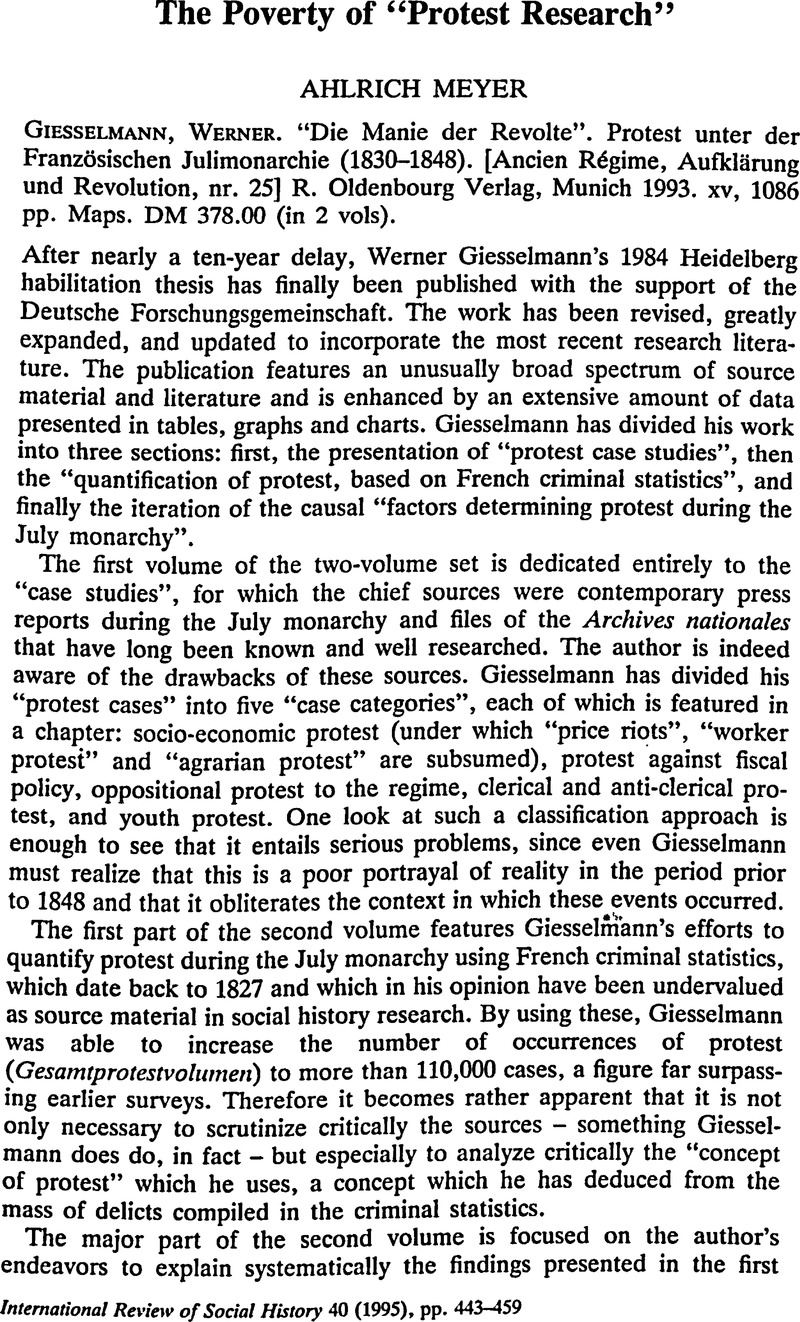Article contents
The Poverty of “Protest Research”
Review products
Published online by Cambridge University Press: 20 February 2009
Abstract

- Type
- Review Essays
- Information
- Copyright
- Copyright © Internationaal Instituut voor Sociale Geschiedenis 1995
References
1 In 1985 I attempted to formulate such a critique, if in a polemically exaggerated form and in a rather remote publication: “Massenarmut und Existenzrecht”, Autonomie, new series, 14 (Hamburg, 1985), especially pp. 86–88.
2 Giesselmann knows that “direct access to the subject matter […] of a good 160,000 rebels” remains unattainable (p. 619), that “the rebellious subject with which we are dealing […] also acts rebelliously in such a way that, for the most part, it evades the direct grasp [!] of the historian” (p. 654). Yet in the course of his research, Giesselmann must have delved so deeply into the world of the “nameless and mute” that he could assume an intimate relationship with the perpetrators of protest: he calls them at different points “our machine stormers” (p. 127), “our workers” (p. 160) or “our striking workers” (pp. 164–165), “our accused” or simply “our rebels” (p. 605, etc.).
3 The statistics in question are the Compte général de I'administration de la Justice criminelle (CJC) for 1827 and subsequent years.
4 This is the wording introduced by Giesselmann.
5 Arendt, Hannah, Elemente und Ursprilnge totaler Herrschaft (Munich, 1986), pp. 28ffGoogle Scholar.
6 Thompson, Edward P., “The Moral Economy of the English Crowd in the Eighteenth Century”, Past and Present, 50 (1971), p. 116CrossRefGoogle Scholar.
7 Perrot, Michelle, “La femme populaire rebelle”, in Dufrancatel, Christiane et al. L'Histoire sans qualité (Paris, 1979), pp. 123–156Google Scholar.
8 See Obermann, Karl, “Wirtschafts- und sozialpolitische Aspekte der Krise von 1845–1847 in Deutschland, insbesondere in Preuβen”, Jahrbuch für Wirtschaftsgeschichte, 7 (1972), pp. 141–172Google Scholar.
9 Soboul, Albert was the first to point out the importance of these files in Problèmes paysans de la révolution (1789–1848) (Paris, 1976), p. 282Google Scholar.
10 Giesselmann is not particularly exact in his wording. Sometimes he refers to “deprivation theory” (p. 66), other times to “deprivation thesis” (p. 68) or “deprivation approach” (p. 1004), and occasionally “deprivation” is also labeled as “category” (p. 955). This impression alone gives cause to doubt the scientific nature of the author's terminology.
11 Tilly, Louise A., “The Food Riot as a Form of Political Conflict in France,” Journal of Interdisciplinary History, 11 (1971), pp. 23–57CrossRefGoogle Scholar.
12 It does make a difference, by the way, whether one is referring to the “causes” of the riots or from the “motives”, meaning the normative justifications. Giesselmann does not always sufficiently distinguish between the two.
13 A chief source for Giesselmann's case studies on “workers' protest” is the study by Aguet, J.-P., Contribution à I'histolre du mouvement ouvrier français. Les grèves sous la Monarchic de Juillet (1830–1847) (Geneva, 1954)Google Scholar.
14 On page 346 we read: “Babeuf's fellow conspirator Buonarotti, who returned to France during the July monarchy, had with his Conspiration des Egaux (1838) […]”, etc. The author's name was Buonarroti, the book was published in 1828 in Brussels under the title Conspiration pour I' Égalité dite de Babeuf.
15 The “wanted” poster reads: “This is a man between 21 and 30-years-old, single, living in a small, rural community, who was born and lives in the département in which he is being tried, illiterate, employed in agriculture, no previous convictions, and it can be added, a member of the lower class” (p. 620).
- 1
- Cited by


